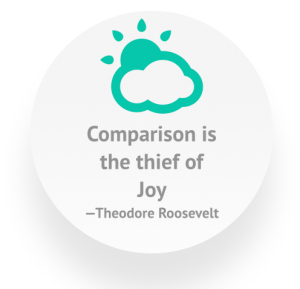What would you do if your personal emails were exposed to the world? Could some of the comments you made in "private" be misconstrued or become downright embarrassing? Let's look at at some leadership insights from the Tom Brady email leak by Roger Goodell and the National Football League.
Part of the NFL's investigation of the alleged deflation of footballs by the New England Patriots in last season's playoffs included the confiscation and release of personal email exchanges between Tom Brady and some friends. A few emails that received relentless media and social media attention regards the never-ending comparison between Brady and Peyton Manning, and Brady's desire to be the best.
 Comparison Trap
Comparison Trap
The gist of the email flap is that Tom Brady wants to be greater than Peyton Manning, and he speaks to characteristics of longevity and commitment that distinguish him and his team.
Comparison makes for interesting conversation and media attention, but it's a distraction from your own personal goals and those of your institutional. As Theodore Roosevelt wisely pointed out, "Comparison is the thief of joy." It doesn't help you accomplish your goals because it distracts from your own unique strengths, natural instincts, and genius.
As illustrated by Tom Brady's attitude in the emails, your success can actually be perceived as a threat by others. Unfortunately Brady allowed a fixed mindset to creep into his thinking, rather than seeing how the competitive greatness of Peyton Manning has actually expanded the historical significance of Brady's own football career and leadership success. The same way Larry Bird and Magic Johnson competed but also enhanced the legacy of each other.
To maximize your growth, focus on the mirror more than the glass. Stop comparing yourself to others, and stop comparing your school to other schools. Instead, renew your commitment to being the best version of you possible and build incremental progress toward that goal.
Keep it in Perspective
In response to reporters who were trying to provoke an emotional reaction after the emails were released, Manning wisely redirected by keeping it in perspective: "Somebody said I was roasted, I've been roasted before and that is not roasted....I can promise you that email was amateur night compared to some of the things that were said about me.''
People are going to talk about Manning and Brady, and those in your school community are going to talk about you as well. Whether you're a board member, administrator, or teacher, it's highly likely that things will be said about you--sometimes even nasty gossip that attacks your character. Your emotional intelligence is an asset as you develop ways to cope with this challenge.
You might, for example, keep an encouragement folder that contains notes and emails from people who have acknowledged your achievements or contributions to their lives. When conflict arises, remind yourself of the good things you have done. Pick out the nuggets of truth from the naysayers, and mostly tune them out. Opinion is cheap because the supply always exceeds the demand.
The Power of Forgiveness
Manning said he received a message of apology from Brady, which was apparently received graciously. I can unequivocally absolutely positively guarantee this:
During this school year you will give others a reason to forgive you and other people (even your closest confidants) will give you a reason to forgive them.
The power of forgiveness is transformative for you, for your school, for your students, and for the other people around you. Forgiveness is an act and a state of grace, where you release the desire to payback or punish. It lowers your stress, improves your health, and transforms your outlook on life. Such a grace-filled approach is especially impactful on the teacher-student relationship.
Confidentiality Cannot Be Assumed
When Brady sent those emails, he may have been sitting at dinner or lounging by the pool with his mind in a myriad of places. The exchange obviously was casual and between friends. Unless you have the unusual power of Hillary Clinton, always assume that your emails will become public knowledge.
Confidentiality cannot be assumed. Whether accidentally or intentionally, each email can so easily be forwarded or copied to others--people who you never wanted to see the message. Be careful what you put into writing because of the risk of unintended readers and the lack of non-verbal communication that can be so valuable to you accomplishing your purpose.
Both Manning and Brady have proven themselves to be highly effective leaders for their teams, and a major contributing factor is their unflappable approach to the game and to life. These are skills that can be learned and will make a huge impact on your life as well.


